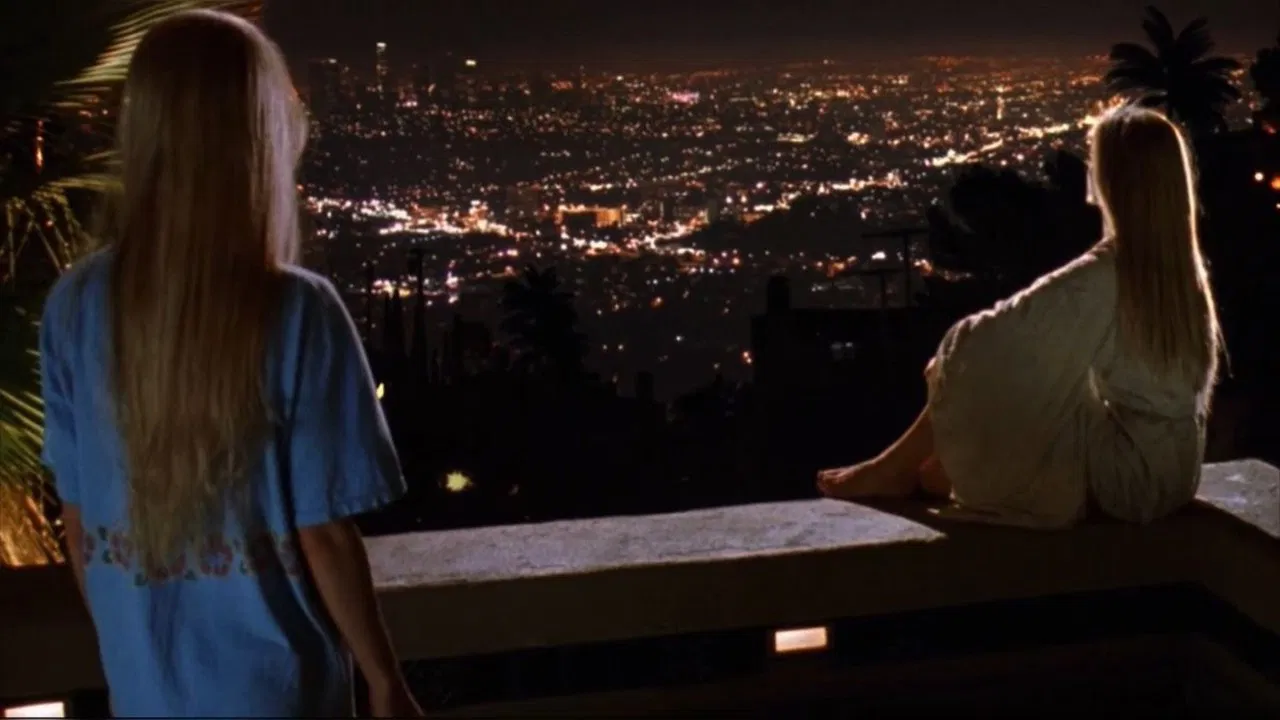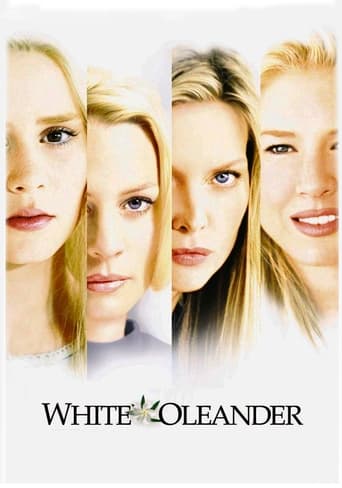

This is How Movies Should Be Made
... View MoreNot even bad in a good way
... View MoreGreat Film overall
... View MoreBetter Late Then Never
... View MoreAstrid is only 15 years old, living in California with her free spirited mother. Things aren't as jubilant as they seem. Her mother falls in love with a man named Barry. In a rage of jealousy for dating another woman, Astrid's mother murders Barry and gets hauled off to prison. Astrid moves from one foster home to another. Along the way, she inadvertently makes a woman succumb back to alcoholism, gets sent to the hospital from a gunshot wound, witnesses a suicide, and falls in love herself. Before you decide to watch this movie, make sure you're in the right frame of mind, as it's a very depressing experience. This isn't one of those movies that will leave your head as soon as you are done watching it. It sticks with you for a long time. It's been a while since I have thought about a movie before going to sleep. This movie reminded me of my troubles with my Mother. In a very different way, of course, but it reminded that you only have one birth mother, and there is nothing you can do to change that. Each encounter with the foster parents is disturbing in different ways, the worst for me was Renee Zellweger. She was a gentle soul who was too emotionally broken for her own good. The storyline between her & Alison Lohman haunted me. Speaking of Lohman, I thought she was phenomenally good. She was so poised. Her repressed emotions made me feel for her in a big way. Her character is so likable, you just want to help her at times, even though you can't. That's how you know you give a great performance when you act like they are real. Watching her evolve throughout the film was unforgettable. Michelle Pfeiffer is just as good as Lohman is. Her beauty is hypnotizing. Her hypocritical character is alternately heartbreaking and surreal. You'll definitely feel mixed emotions when it comes to her. The final confrontation between Pfeiffer & Lohman was chilling to watch. Robin Wright is excellent, so is Cole Hauser in a more subtle way. Keep an eye out for a Melissa McCarthy cameo as a paramedicFinal Thoughts: This movie was very hard to review. I don't think i'll watch this movie again, anytime soon. It's a fantastic film, but emotionally exhausting. You expend so much energy on your emotions, while watching this movie. The score, the acting, and the story is near perfect. It's a movie you won't forget. 9.3/10
... View MoreSince the birth of Hollywood, countless films have aspired to dispel the myths surrounding the city of lights, cameras, and action. Films like 1950's "Sunset Boulevard" and 1991's "Bugsy" have juxtaposed palm trees, sunshine, and mansions with murder, jealousy, and madness. These films look pretty and bright, but they showcase the darkest shades of human nature. With his adaptation of Janet Fitch's novel "White Oleander," Peter Kosminsky tries to join the ranks of such Hollywood demystifiers as Billy Wilder and Robert Altman. On that front, he succeeds only marginally. However, on other fronts, he accomplishes quite a bit.When her mother goes to prison for a violent act of vengeance, young Astrid, the protagonist of "White Oleander," floats from foster family to foster family. Due in part to the efforts of her conniving mother Ingrid, Astrid cannot seem to settle down in any one place; conflict always strikes. As time goes by, innocent Astrid must confront the cruelest of circumstances, again and again. Her foster mothers have strikingly different characteristics, but no one of them is what she seems. From her beautiful but selfish mother (Michelle Pfeiffer) to the allegedly "saved" but jealous Starr (Robin Wright) to the kindly but ill-equipped Claire (Renee Zellweger), Alison Lohman's Astrid seems to have nowhere safe to turn.The film's poster says almost all that needs to be said about the plot and theme of "White Oleander." The poster displays the faces of the four leads; all four are blonde, all four look beautiful, and each face seems to meld into the next. While beauty resides, an eeriness pervades the image; everything looks a little too perfect. As it happens, it is. Each face hides some tragic truth that will guide the flow of Astrid's young life. Like the shining city in which the film takes place, the leading ladies of "White Oleander" are externally pretty but internally dark and unstable. This is ail very well, but we've seen it before, done better, in other films. The larger arc of Astrid's character comes across brilliantly, but the structure moves in episodic fashion, which prevents the film from having a true climax. Moreover, the movie's supposed payoff, an imminent confrontation between Astrid and Ingrid, comes across as simply a rehash of what the audience already knows. The film seems too desperate at times to make its point; it even resorts to wistful narration that, while softly spoken, still manages to hit the viewer over the head. Even some of the shots in the film try so hard to show eerie beauty that they come across as hackneyed and heavy-handed. Still, "White Oleander" offers up a lot of greatness in other areas.All four "leading" performances work brilliantly. Alison Lohman has a great understanding of her character, and thus manages to play every one of her emotional and physical states with conviction. While not given much screen time to flex her always exciting acting muscles, Robin Wright fleshes out her Bible-thumping mother with just enough humanity to make her believable; the character stands as a bit of a stereotype, but Wright at least gives it emotional resonance. Even better is Zellweger as Claire. She communicates sweetness and quiet instability with shocking humor and grace; just as Astrid loves and admires her, we do. All things considered, though, Michelle Pfeiffer gives the performance of the film. As Ingrid, she is ferocious. An actress who rarely resorts to theatricality for her roles, Pfeiffer plays every scene so true to character; she is truly scary. In the end, "White Oleander" moves fairly quickly, although not very subtly, towards a disappointing finale. It will not be remembered for its not-so-groundbreaking plot, but it should be remembered for its brilliant performances. Where the film sometimes fails to show the whitewashed grime of its city, the actresses compellingly render the whitewashed grime of humanity.
... View MoreI might have heard the title somewhere, I think what appealed to me more was a good cast list and a good sounding plot. Basically fifteen year old Astrid Magnussen (Big Fish's Alison Lohman) has her life changed when her free-spirited poet and artist mother Ingrid (Michelle Pfeiffer) sent to prison for murdering Barry Kolker (Billy Connolly) with the deadly poison of her favourite flower, the White Oleander. Astrid has to go through foster home after foster home with three different women, all with their good sides, but ultimately all ending badly. First with trailer-park Christian Starr (Forrest Gumps' Robin Wright Penn) who turns out to be an alcoholic and loses it with Astrid. Second with struggling actress Claire Richards (Renée Zellweger) who seemed the perfect, ideal guardian, but after being told by her husband Ray (Pitch Black's Cole Hauser) she overdoses on some pills. Third and last is wily hustler Rena Gruschenka (Svetlana Efremova), not a very long stay, and not as interesting as the other two. While Astrid goes through all these experiences, she keeps in contact with her mother with letters and a couple of prison visits. Going through forbidden love, religion, a near-death experience, drugs and starvation, Astrid learns to think for herself, and in the end, her mother decides not to ask her to give her statement in her court case, and lets her go to live her own life. Also starring Patrick Fugit as Paul Trout and Noah Wyle as Mark Richards. Lohman is a fantastic young leading actress, Pfeiffer as her over-opinionated mother does well, and Zellweger is most appealing as the second guardian, you feel sympathetic for her, especially when she's dead, a very watchable drama. Good!
... View MoreIt is likely that if you enjoyed "Speak" (2004) you will connect with "White Oleander" (2002). Both are based on novels about a traumatized teenage girl who overcomes mega-adversity; heroines who get stronger as the story progresses. Both are told entirely from the point-of- view of this central character; Melinda (Kristen Stewart) in "Speak" and Astrid (Alison Lohman) in "White Oleander". Both actresses are physically small and the directors in each film effectively utilize this to reinforce their vulnerability. And each Cinematographer gets maximum effect from the camera as both films are filled with tight shots of the heroine's face. Like Stewart, Lohman gives an incredible non-verbal performance, which is nicely offset by her voice-over narration. Astrid's flat and distanced narration is often contradicted by the crushing emotional trauma she is experiencing on the screen, this dichotomy is a very effective way to illustrate her inner strength and multi- dimensionality. "White Oleander's" strength is the way it soft-peddles the overwrought melodrama by skimping on the "Mommie Dearest" moments. Instead of a focus on the relationship between an imprisoned mother (Ingrid-played Michelle Pfeiffer) and her abandoned daughter, the film is about Astrid's journeys; her physical travels around the Los Angeles area to different foster care situations and her internal journey from dependency to independence. Mother and daughter are both artists (although Astrid is also an observer) and the director symbolically incorporates color into the story. White is "Ingrid's color and Astrid's eventual independence occurs when she adopts black as her color late in the film. When she finally comes to terms with how much of her mother is in her, she returns to white. The blondes are out in force as Robin Wright Penn and Renee Zellweger play two of Astrid's foster mothers. All three supporting performances are excellent. Pfeiffer plays a humorless version of her "I Could Never Be Your Woman" mother; a mix of ascetically refined artist and imperious sociopath. Lohman has all of Pfeiffer's delicate beauty so the mother-daughter connection requires no suspension of disbelief. Astrid's foster kid desperation for family leads her to adopt the characteristics of her caretakers, adopting religion while with born-again ex-stripper Starr (Wright Penn) and yuppie indulgence while with depressed actress Claire (Zellweger). There's a tragic quality to Claire that is unlike anything Zellweger has done before. She is the anathema of Astrid's chilly, threatened mother. This is a film where the make-up and hair people earned their pay as Astrid's adaptation and life changes are underscored with very effective changes in her physical appearance. As in "Speak" flashbacks are effectively used at points throughout the story. The DVD special features commentary is about as good as it gets. The author Janet Fitch is featured along with Director Peter Kosminsky and Producer John Wells. Fitch seems quite pleased with the adaptation of her novel and seems to get it that a modest budget feature film can only focus on a portion of her original story. Then again, what do I know? I'm only a child.
... View More